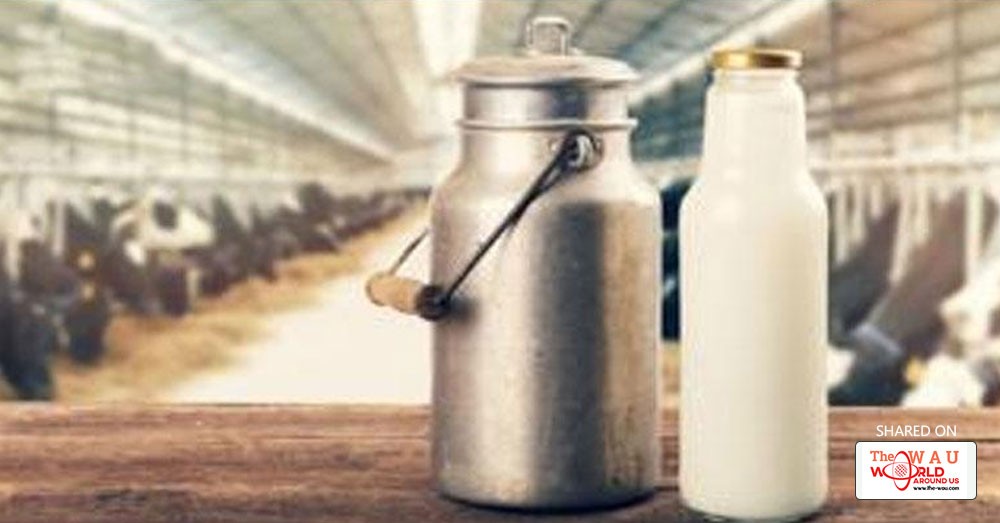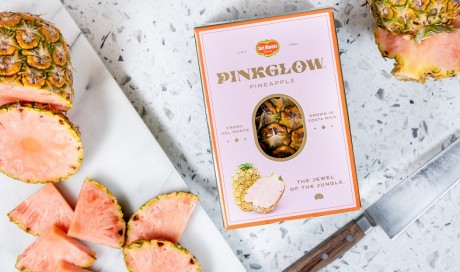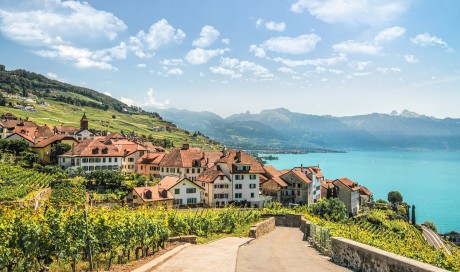You don't export fresh milk. It doesn't make any sense. Received wisdom is it's too heavy and bulky and goes off too quickly.
Instead your only option is to take milk and then turn it into products that are much easier to send oversees like cheese, milk powder or butter.
Well I'm here to tell you received wisdom is completely wrong. To the tune of £5 for two litres of milk.
A little bit awkwardly, this was received wisdom I believed in.
I never thought I'd meet a Shropshire farmer sending his milk to supermarkets thousands of miles away.
And yet on a drizzly autumn day on Little Cloveley Farm near Whitchurch, that's just what happened.
There I was, standing talking to a farmer sending his milk to Qatar. And David Price was an extremely happy dairy farmer, as he says this new export trade is "fantastic".
So how on earth did this happen? Well, it's a mixture of top quality British milk, savvy exporters and Middle East politics.
Nimble Operation
Cows on Little Cloveley Farm near Whitchurch in Shropshire ready for afternoon milking
David Price sends his milk to a dairy called Nemi, which is based in Cheshire.
Nemi bottle milk from farmers in Cheshire, Staffordshire and Shropshire and they pay very close attention to the diet their cows eat, aiming for milk that is rich in selenium and for which they can charge a premium.
Paying their farmers a good price for their milk.
Nemi are also a relatively small and pretty nimble operation which turns out to be important if you want to try doing what no one else has ever done before and export fresh liquid milk.
But none of this could have happened without some recent Middle East politics.
Saudi Arabia and its allies are currently blockading Qatar, a news story you can read more about here.
One of the effects of that embargo is no more fresh milk in Qatar because their daily pinta is mostly imported from giant Saudi Arabian dairy farms.
Red tape and Insulation
The milk has to be relabelled in Arabic before export
When the Saudi embargo began, boss Ricky Perks wondered if he and his team could fill this milk-sized gap that had just appeared in Qatari supermarket fridges.
So Ricky and Andrew Henderson of Nemi put their heads together to see if they could make exporting liquid milk work.
It is not an easy thing to do. There are all sorts of problems that need to be overcome.
First here's plenty of red tape that needs to be dealt with, from the relabeling of all the milk in Arabic to the demands of Qatari customs.
The milk is packed with lots of insulation for its fight from the UK to the Middle East.
Then there are the physical problems of transporting the milk thousands of miles on an aeroplane.
The milk must be packed on a pallet with enough insulation to cope with the journey and even survive sitting on a hot runway after landing.
Here, a smaller dairy like Nemi has some inbuilt export advantages as they already have a fast moving supply chain producing really fresh milk that can survive the rigours of export.
Five pounds a bottle
From farm to Qatari supermarket takes around four days and when it arrives the fresh milk will have a seven-day shelf life.
Mind you, it also comes with a pretty hefty price tag. A standard two-litre bottle may cost around a pound here but by the time it gets into a Qatari shopping basket the consumer will be paying over a fiver for it.
Nemi milk is sold through Lulu hypermarkets in Qatar
Once on sale there's another advantage for a dairy like Nemi.
With their focus on the diet of the cows and the higher levels of selenium this is a very different bottle of milk to your standard "loss leader" supermarket poly bottle.
Nemi think of their milk as a premium product and that's how they market it in Qatar.
Their new labels for the export trade push that idea even further with the British flag and even Big Ben prominently featured.
Consumers in the Middle East associate this maximum Britishness with high quality and they will pay for it.
Finally there's the natural advantage of British milk that we tend to overlook in the UK basically it tastes good.
Especially compared to the local competition.
However impressive it is to produce milk in the desert of Saudi Arabia, the consumers of Qatar seem to prefer the taste of Shropshire milk from cows eating fresh green grass.
India or China next?
And that is how I came to be standing in a Shropshire field meeting some lovely lady cows who's milk would be on sale thousands of miles away in an air conditioned mall in a baking desert country.
So what's the long term business here? If the blockade ends could Saudi milk make a comeback?
Maybe, but in Birmingham, Y International and Nemi have plans.
If you can get milk to Qatar, why not India or even China? Millions of new consumers who could value fresh British milk and be prepared to pay a lot to get their hands on it.
Even if our milk only becomes a relatively niche product in China, that's still potentially huge amounts of milk for our farmers to export.
Right now this is a small export business finding its feet. But if this team can make it work then an real fresh milk export trade could revolutionise life for our dairy farmers.
Share This Post















